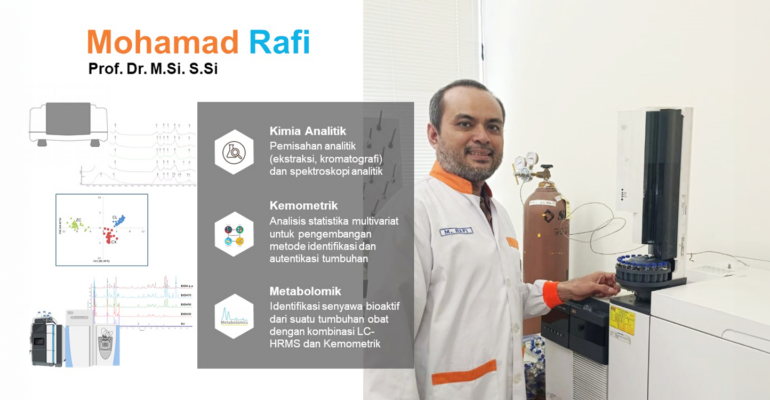IPB University Analytical Chemistry Expert Conveys Recent Developments in Chemical Component Analysis Devices for More Accurate Results

Currently, analytical chemistry has utilised many technological developments and knowledge that continues to grow, both from chemistry and from other scientific disciplines. Analytical chemistry has made tremendous contributions in today’s scientific world, for example in the fields of materials, nanotechnology, omic science, and more specifically in biological sciences, biochemistry, biomedicine, biotechnology and others within the framework of chemical component analysis.
In analytical chemistry, there are several fields of science, one of which is analytical separation. Commonly known analytical separations such as extraction and chromatography, are used to separate individual components in a sample which are then analysed individually without interference from other chemical components.
Prof Mohamad Rafi, Analytical Chemistry Expert at IPB University explained the latest developments in chemical component analysis tools for more accurate results. Several unconventional extraction methods have been developed such as ultrasonication extraction, microwave, solid phase microextraction and have been widely applied for sample preparation in the fields of chemistry, pharmacy, food, agriculture, health, environment, and herbal medicine.
He revealed this in the Press Conference of Pre Scientific Oration of Professor of IPB University, Wednesday (22/5) with the material title “Recent Development of Analytical Separation as a Tool for Chemical Component Analysis”.
“One of our studies is the extraction of phenolic and flavonoid compounds from bay leaves (Syzygium polyanthum) with the help of experimental design to find the optimum conditions for extraction. Chemical compounds from natural materials are extracted to obtain the target chemical component or the whole,” he said.
To obtain pure chemical components, he said, further separation is necessary. Currently, chromatography is the most effective and efficient separation method in obtaining pure chemical compounds. The development of chromatography techniques today is mostly done to improve the efficiency and effectiveness of separation.
Not only that, Prof Rafi also talked about metabolomics as a promising approach. It aims to facilitate the composition of chemical compounds in biological systems. Analytical separation will play an important role in metabolomics research because it is related to the metabolite profile in a sample that must be separated to improve the detection and identification of the metabolites it contains.
“The development of methods for simultaneous analysis of bioactive compounds coupled with fingerprint analysis is also a trend in quality control of medicinal plants. We have developed methods for simultaneous analysis of curcuminoids and xantorizol in temulawak (Curcuma xanthorrhiza), identification and authentication methods of cat’s whiskers (Orthosiphon aristatus), and discrimination of brown and white rice bran. The methods developed have been validated so that they have good accuracy,” he said. (dh/Rz) (IAAS/RUM)



